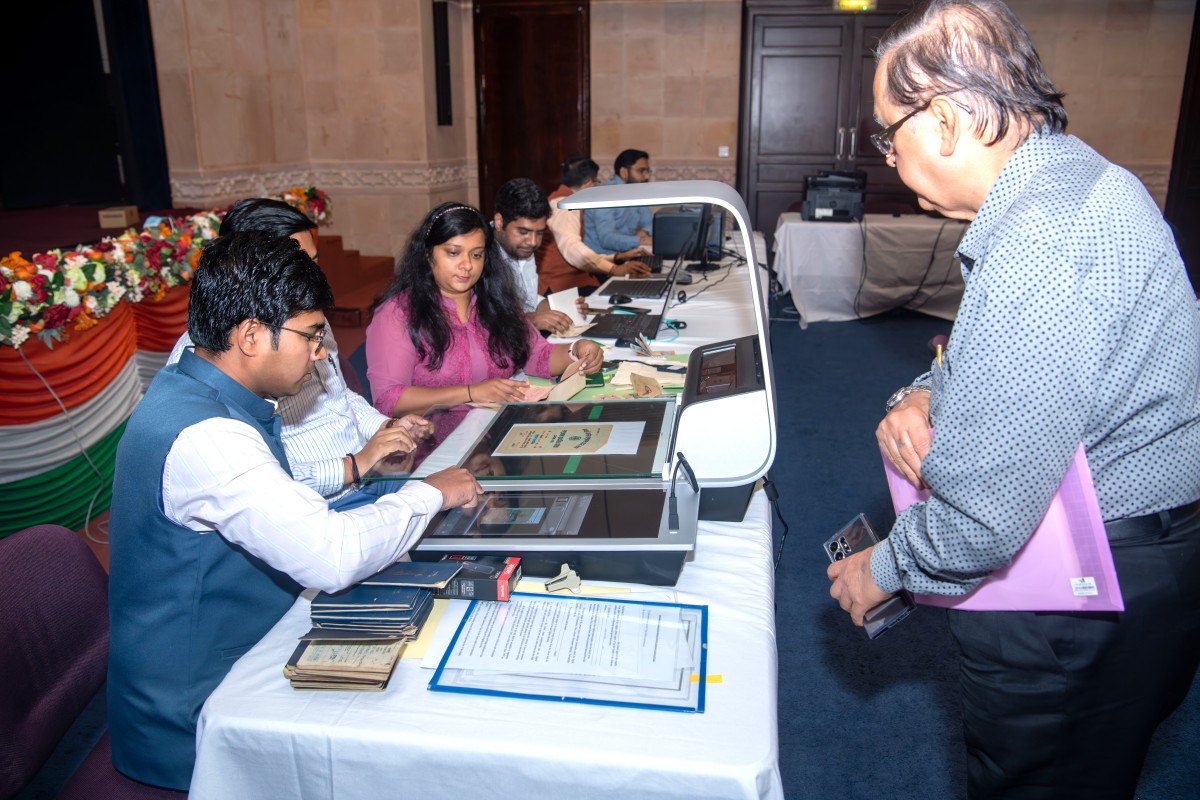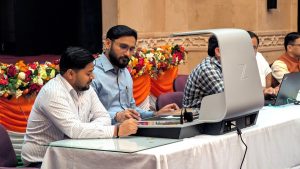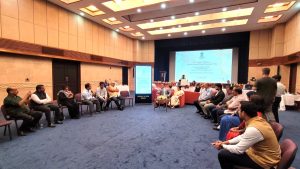Oman
First Ever Digitization Project For Historical Documents Of The Indian Diaspora Concludes In Muscat

Embassy of India Muscat, in association with the National Archives of India (NAI), has successfully conducted a unique and pioneering initiative to archive historical documents of the Indian diaspora living in Oman.
‘The Oman Collection – Archival Heritage of the Indian Community in Oman’ – a special digitization and oral history project was conducted at the Embassy of India premises in Muscat from May 19-27, 2024 and saw enthusiastic participation of 32 prominent Indian families hailing from the state of Gujarat in India, whose presence in Oman spans several generations and dates back to 250 years.
This was the first overseas project of the NAI for digitizing and archiving diaspora documents, marking an important step in preserving the history and heritage of the Indian community abroad.
Indian Community in Oman
Today, Oman is home to nearly 700,000 Indians. India and the Sultanate of Oman share a rich tapestry of historical and cultural connections that go back 5000 years. In recent times, several merchant families mainly from Mandvi, Surat and other parts of Gujarat have been resident in Sur, Muttrah and Muscat since the late 18th century CE.. They are an integral part of the Omani society, many having become Omani citizens, but also maintain strong ties with their motherland India.
Record number of documents digitized
Over 7000 documents in English, Arabic, Gujarati, and Hindi languages from the private collections of the old Indian merchant families were scanned and digitized under this project. The oldest digitized document dates back to 1838, while a large majority date from late 19th and early 20th centuries.
The wide variety of documents digitized include personal diaries, account books, ledgers, telegrams, trade invoices, passports, citations, letters & correspondences, photographs etc that shed a fascinating light into the lives and contributions of the Indian community in the Sultanate of Oman.
These documents collectively constitute a vivid narration of the history of the Indian community in Oman, including their cultural practices, social activities, trade and commerce, as well as their contributions to and integration into the Omani society, and the preservation of Indian traditions abroad.
The digitized documents will be archived and uploaded on ‘Abhilekh Patal’, the digital portal of the NAI, making these documents available to researchers and wider public.
Private collections of the following Indian/Indian-origin families have been digitized:
- Ratansi Purshotam family
- Khimji Ramdas family
- Haridas Nensey family
- Bhanji Haridas Mundrawalla family
- Naraindas and Shanta Toprani family
- Maganlal Manji Vyas family
- Vijay Singh Veljee Pawani family
- Lakhoo’s Ved family
- Chimanlal Chhotalal Surti family
- Jayantilal Wadher family
- Kanojia family
- Ramesh Khimji family
- Visoomal Damodardas family
- Vijay Singh Purshotam Toprani family
- Jamnadas Keshavji family
- Naranjee Hirjee family
- Velji Arjun Pawani family
- Purshotam Damodar family
- Pandya family
- Meghji Nenshi family
- Shah Nagardas Manji family
- Ajit Khimji family
- Khatau Ratansi Toprani family
- Ratanshi Gordhandas Bajaria family
- Harshendu Hasmukh Shah family
- Khubo Gurnani family
- Mohanlal Arjun Pawani family
- Dhanji Moraji “Shabica” family
- Ebji Sundardas Asher
- Dharamsey Nensey
- Kiran Asher family
- Bakul Mehta family
Oral Histories Recorded
In addition to the digitization of historical documents, the project also involved recording of oral histories of the older members of the Indian community, the first such oral history project by the National Archives of India. These firsthand narratives capture a wide range of stories, including personal anecdotes, migration experiences, and the evolution of the Indian community in Oman over the decades and will enrich the archival records.

Noting the unique significance of this project, Shri Arun Singhal, Director General of the National Archives of India (NAI) stated “This is the first time that we have collected and digitized the private archives of diaspora documents from abroad. This marks a historic milestone for the NAI and a significant step towards preserving the rich heritage and narratives of the diverse overseas Indian community”.
H.E Amit Narang, Ambassador of India to the Sultanate of Oman noted that “This project aligns with Prime Minister Shri Narendra Modi Ji’s vision to strengthen connections with the Indian diaspora worldwide. By documenting and preserving the history of the Indian community in Oman, we are rekindling a vital part of our shared heritage and fostering a deeper engagement with our diaspora“.
Sheikh Anil Khimji, head of the Indian community in Oman, expressed his appreciation for the project.
He said “We thank Prime Minister Shri Narendra Modi and External Affairs Minister Dr. S. Jaishankar for their vision of engaging and connecting with the Indian diaspora. The archiving of the historical documents of the Indian diaspora by Embassy of India will go a long way in preserving their history and in doing so also showcase the time-tested bonds of friendship between India and the Sultanate of Oman“.
The initiative was supported by the National Records and Archives Authority (NRAA) of Oman, which provided essential logistical and other support, ensuring the smooth execution of the project.
In addition to preserving historical records, the digitization project seeks to foster a more focused engagement with the Indian diaspora community in Oman, and in doing so will promote a better appreciation of the longstanding India-Oman friendship. The project will facilitate better research about the Indian diaspora’s development and contributions and will serve as a valuable resource for future generations.

-

 Banking & Finance2 months ago
Banking & Finance2 months agoOman Oil Marketing Company Concludes Its Annual Health, Safety, Environment, and Quality Week, Reaffirming People and Safety as a Top Priority
-

 News2 months ago
News2 months agoJamal Ahmed Al Harthy Honoured as ‘Pioneer in Youth Empowerment through Education and Sport’ at CSR Summit & Awards 2025
-

 OER Magazines2 months ago
OER Magazines2 months agoOER, December 2025
-

 News2 months ago
News2 months agoAI Security Conference 2025 Hosted by Securado Highlights the Changing Cybersecurity Landscape
-

 Insurance1 month ago
Insurance1 month agoSupporting Community Wellness: Liva Insurance Sponsors Muscat Marathon 2026 with Free Health Checkups
-

 Interviews1 month ago
Interviews1 month agoEXCLUSIVE INTERVIEW: TLS Rebranding Marks Strategic Leap Toward Innovation, Sustainability & Growth
-

 Insurance4 weeks ago
Insurance4 weeks agoLiva Insurance Supports Community Wellness Through “Experience Oman – Muscat Marathon 2026”
-

 Banking & Finance4 weeks ago
Banking & Finance4 weeks agoA New Platform for SME Growth: Oman Arab Bank Unveils Tumouhi






























